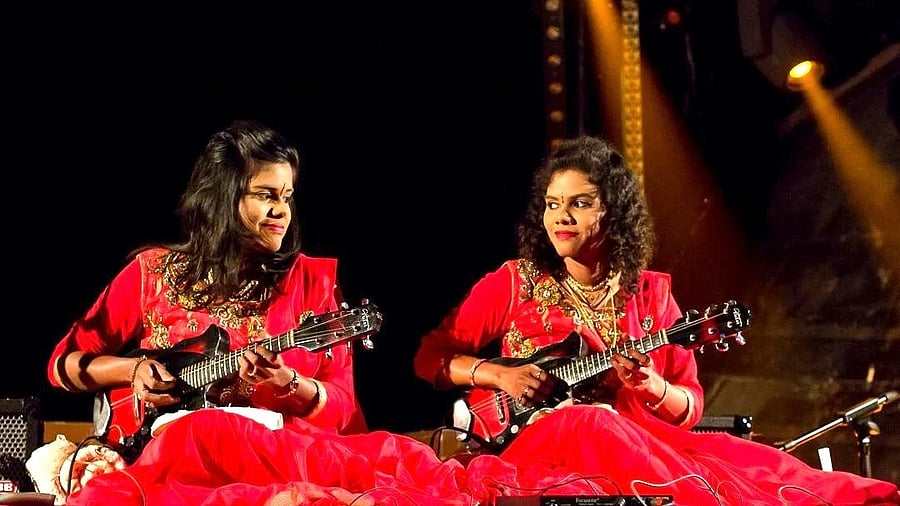
Sreeusha and (left) Sireesha play a modified mandolin with five strings.
Credit: ALAIN PELLETIER
Sireesha and Sreeusha were four and five when they first started strumming their father’s guitar. It was when he was at work and their amused mother let him in on the secret. A few days later, he surprised them with a mandolin each. The stringed instruments, smaller than the guitar, were easier to use for their little fingers. Today, the Chennai-based sisters are among the few artistes who perform Karnatik music on the mandolin.
The mandolin is a pear-shaped instrument with eight strings arranged in four pairs. It produces a twangy, melodic sound. The folksy European tune that one hears in the Bollywood song ‘Tujhe dekha toh ye jaana sanam’ is from a mandolin, says Sireesha. However, the Western instrument, believed to have originated in Italy, isn’t naturally suited to the speed and fluidity of Indian classical music. “It produces a ‘ting, ting, ting’ sound, but in Karnatik music, we need to sustain notes and let them glide from one to another. That’s hard to achieve with the mandolin’s double-string arrangement,” she explains.
The duo plays a modified mandolin with five strings and a different tuning, known as the Indian mandolin. Its design was pioneered by the late legendary musician U Srinivas, with the support of his guru, Rudraraju Subbaraju. Incidentally, Subbaraju was also the sisters’ first teacher. “Even after the modification, it takes a lot of practice and improvisation to master gamakas and ragas on the mandolin,” says Sreeusha. She recalls their teacher telling them how Srinivas, who popularised the instrument within the Karnatik tradition in India, would start practising as early as 3.30 am.
Early in their career, the ‘Mandolin Sisters’ focused on Karnatik compositions at their concerts, showcasing works by Tyagaraja, Muthuswami Dikshitar, and Syama Sastri. But as audience tastes evolved after 2012, they expanded their repertoire to include film songs, as well as fusion of ragas. Their film choices feature iconic Tamil hits by Ilaiyaraaja and A R Rahman, along with Kannada classics like ‘Jotheyali’, the Telugu favourite ‘Srivalli’, and Hindi hits such as ‘Jashn-e-bahaaraa’ and ‘Deewani mastani’. “The theme song of the ‘Pirates of the Caribbean’ comes out well on the mandolin,” says Sreeusha.
Since the mandolin isn’t traditionally used as an accompanying instrument in Karnatik concerts, the sisters perform shows centred entirely on it. They mostly play in Tamil Nadu and other parts of India. Despite being a Western instrument, the Indianised version of the mandolin has won them a devoted following in Europe, where they participate in music festivals every year. “European audiences love the sound of Karnatik music on the mandolin,” says Sireesha.